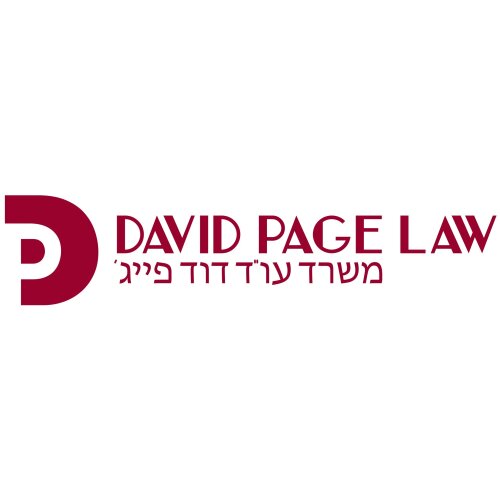Best Inheritance Law Lawyers in Israel
Share your needs with us, get contacted by law firms.
Free. Takes 2 min.
Or refine your search by selecting a city:
List of the best lawyers in Israel
1. About Inheritance Law in Israel
Inheritance law in Israel determines how a deceased person’s assets pass to heirs. The framework is largely shaped by the Succession Law, which covers both wills and intestate succession. When there is no valid will, the estate is distributed according to statutory rules that prioritize spouses and children as compulsory heirs. Wills must meet formal requirements to be enforceable, and probate or administration processes may be needed to settle the estate.
Israel’s system blends civil law concepts with religious and family considerations. Courts interpret the will and intestate provisions to protect the rights of forced heirs while allowing individuals to shape their legacy through valid testamentary documents. Understanding these rules helps families avoid disputes and delays during a difficult time.
2. Why You May Need a Lawyer
These real-world scenarios show when you should engage a qualified advocate specialized in inheritance law in Israel. Each example reflects common pitfalls or complexities that benefit from legal guidance.
- Your spouse wants to challenge a will that disinherits you or assigns you a significantly smaller share. An advocate can assess forced heirship rights and contest grounds such as undue influence or lack of capacity.
- You are an heir and need to navigate probate or estate administration after a relative dies without leaving a will. A lawyer helps locate assets, file probate petitions, and coordinate with the court.
- There is real estate in Israel owned by multiple heirs, and disagreements arise over property division, mortgages, or sale timing. A lawyer can draft agreements and seek court approval if needed.
- A will was drafted abroad but the decedent lived in Israel at death, or assets are located in Israel. A local advocate helps with recognition and enforcement of foreign wills and local probate procedures.
- You suspect someone is attempting to misappropriate an estate or alter beneficiary designations without proper authority. An attorney can pursue remedies and preserve assets.
- You want to minimize future disputes by converting informal arrangements into a legally valid will or trust structure, and ensure tax and transfer implications are addressed.
3. Local Laws Overview
The core framework for inheritance matters in Israel rests on the Succession Law, which governs both testate and intestate transfers. It also interacts with guardianship and administration provisions when minors or incapacitated individuals are involved. Below are two or three specific laws and regulations commonly relied upon in practice.
- Succession Law, 1953 (חוק הירושה, התשי"ג-1953) - Establishes the framework for intestate succession and the validity and effect of wills. This statute is the backbone for how assets pass when there is no will and how forced shares are allocated to close family members.
- Guardianship and Administration Regulations (חוק האפוטרופוס הכללי והאפוטרופסות) - Addresses appointments of guardians and the administration of estates for minors or adults lacking capacity, including how property is managed during guardianship.
- Estates Administration Provisions (התקנות ניהול עיזבון) - Sets out procedural steps for settling an estate, including notarization, probate petitions, and distribution orders, when there are multiple heirs or complex assets.
Source: Ministry of Justice and Israeli judicial resources outline the role of Succession Law in determining heirs and probate steps. https://www.justice.gov.il
Source: Israel Bar Association and official state portals discuss guardianship and estate administration procedures for minors and incapacitated persons. https://www.israelbar.org.il
Recent trends and changes - In recent years, courts have placed increased emphasis on formal validity of wills, recognition of foreign wills, and timely probate to reduce disputes among heirs. Practitioners highlight the importance of clear testamentary documents and timely estate administration to avoid protracted litigation.
4. Frequently Asked Questions
What is the difference between a will and intestate succession?
A will specifies how you want your assets distributed after death. Intestate succession applies when there is no valid will, guiding distribution according to statutory rules.
How do I start a probate case in Israel?
File a petition with the appropriate court for probate or administration. You will need death certificates, a will if one exists, and a list of assets and heirs.
What is the typical cost to probate an estate in Israel?
Costs vary by estate size and complexity. You should expect court fees, potential attorney fees, and administrative costs for asset appraisal and publication.
How long does the probate process usually take?
For straightforward estates, probate often takes several months. Complex cases with disputes can extend to a year or more, depending on court schedules.
Do I need to hire a lawyer to handle an Israeli inheritance matter?
While not always required, a lawyer reduces the risk of errors, ensures compliance with formal requirements, and helps manage negotiations among heirs.
What is forced heirship in Israel?
Forced heirs are relatives who cannot be completely disinherited by a will. The law protects certain shares for a spouse and children.
How can I contest a will in Israel?
Contests typically rely on grounds such as lack of capacity, undue influence, fraud, or improper execution. A lawyer evaluates the strongest basis.
Can a will be amended after it is created?
Wills can be amended or revoked during the testator’s lifetime. Amendments must follow formal execution requirements to be valid.
Should I use a will or another arrangement for asset protection?
Wills are common, but some clients use trusts or joint ownership to address tax planning, asset protection, and succession goals. A lawyer can tailor options.
Do I need to appoint an executor in Israel?
Appointing an executor or administrator helps manage the estate, fulfill debts, and distribute assets according to the will or applicable laws.
Is there a difference between inheriting real estate vs personal property?
Real estate and movable assets may require different registration steps, tax considerations, and transfer procedures within Israeli law.
What if the deceased left assets in multiple countries?
Cross-border estates require coordination between Israeli probate and foreign probate processes, with potential recognition of foreign wills in Israel.
5. Additional Resources
- Ministry of Justice - Succession and Wills (Official government resource with guidance on wills, probate, and related procedures) - https://www.justice.gov.il
- Israel Bar Association (Professional body with resources for lawyers and guidance on inheritance matters) - https://www.israelbar.org.il
- Judiciary of Israel - Court Procedures for Estates (Official information about probate filings and court processes) - https://www.gov.il
6. Next Steps
- Gather key documents within 1-2 weeks: death certificate, original will, copies of property deeds, and a list of heirs.
- Determine whether a will exists and if intestate succession rules apply, by reviewing any prior estate planning documents.
- Identify a qualified inheritance law advocate in Israel and schedule an initial consultation within 2-4 weeks.
- Prepare a scope of work with your lawyer, including expected deadlines and a preferred timeline for probate or administration.
- Request a written fee agreement and outline potential costs, including court fees and administrative expenses.
- File the probate petition or estate administration request with the court, and assemble required affidavits and asset inventory.
- Monitor deadlines, respond to court requests promptly, and seek mediation if heirs disagree to reduce delays.
Lawzana helps you find the best lawyers and law firms in Israel through a curated and pre-screened list of qualified legal professionals. Our platform offers rankings and detailed profiles of attorneys and law firms, allowing you to compare based on practice areas, including Inheritance Law, experience, and client feedback.
Each profile includes a description of the firm's areas of practice, client reviews, team members and partners, year of establishment, spoken languages, office locations, contact information, social media presence, and any published articles or resources. Most firms on our platform speak English and are experienced in both local and international legal matters.
Get a quote from top-rated law firms in Israel — quickly, securely, and without unnecessary hassle.
Disclaimer:
The information provided on this page is for general informational purposes only and does not constitute legal advice. While we strive to ensure the accuracy and relevance of the content, legal information may change over time, and interpretations of the law can vary. You should always consult with a qualified legal professional for advice specific to your situation.
We disclaim all liability for actions taken or not taken based on the content of this page. If you believe any information is incorrect or outdated, please contact us, and we will review and update it where appropriate.
Browse inheritance law law firms by city in Israel
Refine your search by selecting a city.
















